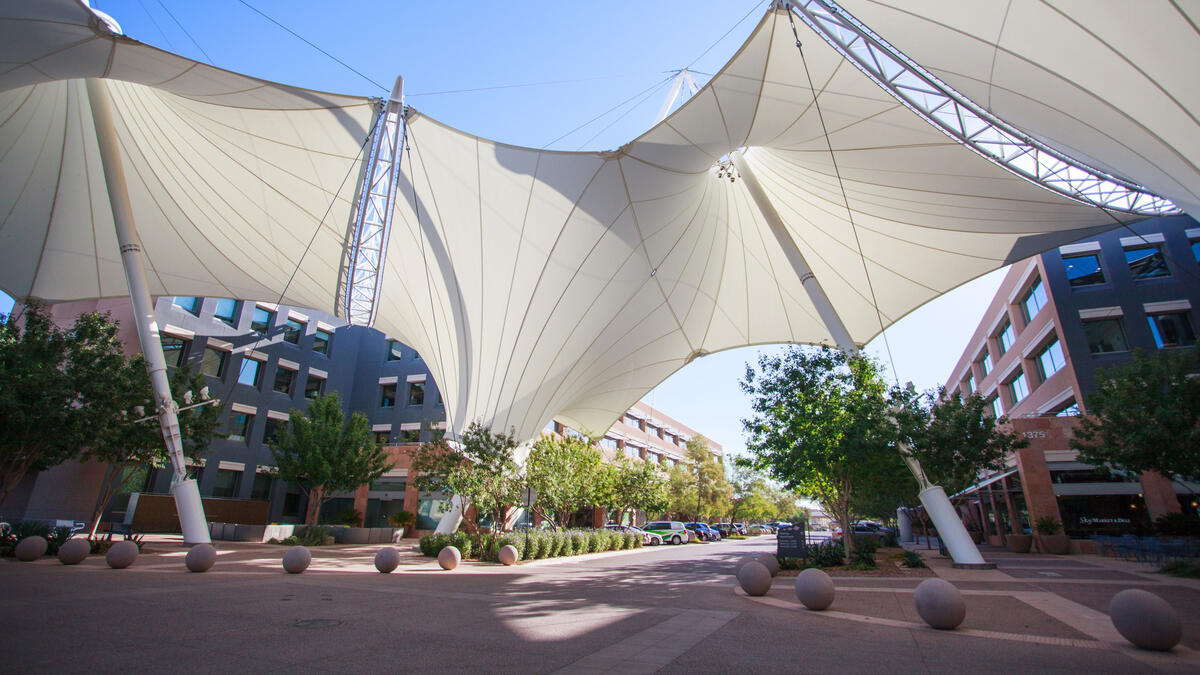Raytheon to open engineering design hub at ASU's SkySong location

Photo by Thurlkill Studios
Leading aerospace and defense company Raytheon has announced that it will be opening a new facility at SkySong, the Arizona State University Scottsdale Innovation Center, adding 28,000 square feet of digital design space to the company's footprint just minutes away from the university’s Tempe campus.
The new engineering design hub will leverage talent in the metro Phoenix area, housing approximately 150 professional positions — 95% of which will be employees new to Raytheon. The location will focus primarily on digital design products that support the rapid growth and demand for the company's defense portfolio, which, to date, has mostly been concentrated in southern Arizona.
“We’ve been working for years to expand our presence in the greater Phoenix area to take advantage of a talent pool that is uniquely qualified to drive this type of innovation,” said Wes Kremer, president of Raytheon. “This expansion will also provide greater opportunities to collaborate with other tech companies and suppliers in the region.”
In addition to expanding its presence to the Valley, the move strengthens Raytheon’s partnership with ASU and its Ira A. Fulton Schools of Engineering, the largest engineering university in the country, to create a steady pipeline of talent for the future and further many research and development projects.
“ASU has a deep commitment to expanding its engagement with defense primes, and co-locating with Raytheon at the ASU's SkySong Innovation Center will enable us to advance our work with one of the strongest companies in the world,” ASU President Michael Crow said. “We welcome Raytheon to greater Phoenix and look forward to a new chapter in our relationship.”
Benefit to both students and companies
Grace O’Sullivan, vice president of corporate engagement and strategic partnerships for ASU’s Knowledge Enterprise, highlights the circular benefits of such collaborations. In addition to the Fulton Schools helping provide a pipeline of engineering talent, companies such as Raytheon provide guidance on ASU’s curriculum to ensure those engineers are gaining skills in demand in the industry today. Industry leaders will sometimes co-teach courses, O’Sullivan said, giving students a real-world view into what it’s like to work in that field.
And there’s another benefit to students getting to work with companies like Raytheon.
“If they’re working on these types of classified projects while they’re still a student, we can get their security clearances started, and by the time they graduate, they can have that seamless transition into industry and be ready to hit the ground running on day one,” O’Sullivan said.
Expanding the classified-talent pipeline is of value not just to defense contractors, but also to consulting companies and the federal government, she said. It makes students and new graduates much more attractive job candidates.
O’Sullivan sees opportunity for expanded educational collaboration with Raytheon in the future.
“This could really be a differentiator for students because of that real-world connection to hands-on opportunities and employment opportunities right after college. When you're thinking about, ‘I'm going to a university where all of these companies want to be on campus with us, that I have opportunities to interact with executives and managers from these companies all throughout my educational experience’ — I think that's super attractive to any student in engineering or any other field,” O’Sullivan said.
Greater Phoenix as innovation hub
With this expansion, Raytheon becomes the newest tenant of SkySong, moving in alongside more than 60 private-sector businesses, from Fortune 500 companies to innovative startups.
There’s a momentum building, O’Sullivan said, as greater Phoenix is becoming known as an innovation hub, with the recent locations or expansions of such companies as Taiwan Semiconductor Manufacturing Company. And being located at an ASU Innovation Zone, as Raytheon will be, allows increased connectivity with the university.
O’Sullivan also highlighted the important role that ASU and the state of Arizona are playing on key national-security issues, such as strengthening the semiconductor supply chain.
“It's really important not only that we're growing our companies here, but also being on that technological leading edge,” O’Sullivan said. “When we’re thinking about microelectronics and the end use and design of that, having (Raytheon) in Phoenix in the mix with ASU, designing the next generation of chips that will help advance national security objectives, is just very exciting.”
Plaza Companies is the master developer of SkySong, in partnership with University Realty, Holualoa Companies and the city of Scottsdale.
“We’re excited to welcome Raytheon as a community partner as they expand their development and innovation expertise, growing the existing ecosystem in Arizona,” Scottsdale Mayor David Ortega said.
Raytheon’s SkySong facility is scheduled to open in fall 2023.
More Science and technology

Stuck at the airport and we love it #not
Airports don’t bring out the best in people.Ten years ago, Ashwin Rajadesingan was traveling and had that thought. Today, he is an assistant professor at the University of Texas at Austin, but back…

ASU in position to accelerate collaboration between space, semiconductor industries
More than 200 academic, business and government leaders in the space industry converged in Tempe March 19–20 for the third annual Arizona Space Summit, a statewide effort designed to elevate…

A spectacular celestial event: Nova explosion in Northern Crown constellation expected within 18 months
Within the next year to 18 months, stargazers around the world will witness a dazzling celestial event as a “new” star appears in the constellation Corona Borealis, also known as the Northern Crown.…

